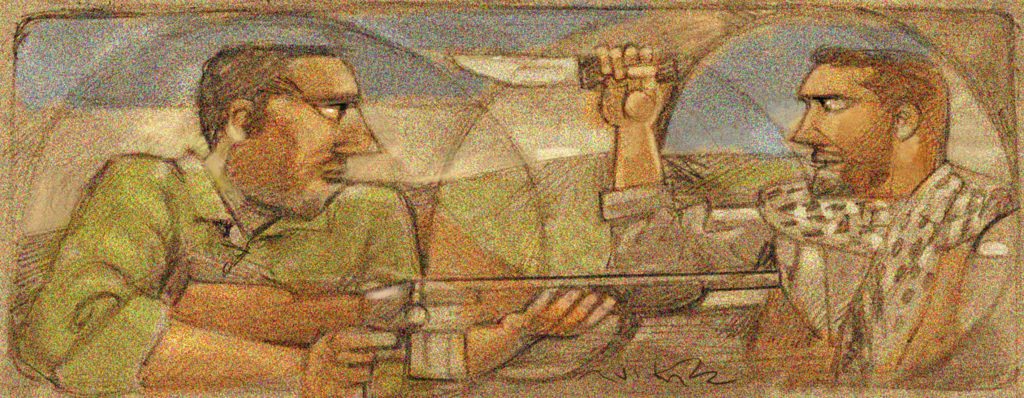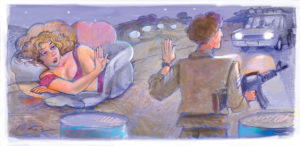Haim Watzman
We circle, weapons drawn, two as one, ready to kill.
I raped the boy in April 1948, in a dark corner in the garden of a villa in Talbieh. A few minutes before he had leapt out from between some bushes, a butcher’s knife flashing. Boaz, a pace away from me, had his eye on the balcony above, fearing a sniper, so he never saw the kid who brought the knife down between his shoulder blades, with a shout of Allah akbar!, or perhaps it was something else. The stars were just coming out, but I saw my friend murdered. I saw the blood spurt from his back and chest as he crumpled.

To this day I wonder how, in the heat of battle, I could have been able to grasp that I was gazing at a face of godlike beauty. I had always assumed beforehand—and, indeed, all my experience since then has confirmed—that when your life is on the line, when you stand on the precipice between life and death, the mind focuses only on keeping you alive. Your eye takes in every detail of the terrain, every clue to where your enemy lies, but nothing of the harmony of the shape of the landscape. Color may be a sign of danger but never moves the heart. Yet, at this instant of vengeance I was nearly unnerved by the splendor that I saw.
Soldier story
Roadblock — “Necessary Stories” from The Jerusalem Report
Haim Watzman

Guy threw his rifle onto the bunk below and began unbuttoning his shirt.
Alon froze in the middle of pulling his pants up. Guy stopped unbuttoning and stared at his friend.
“I switched with Rafi,” he whispered, so as not to wake sleeping men. He pointed his chin at the reservist lacing boots on the next bottom bunk across the fusty barracks room and over one. His head then signaled to the left, at another man who was already down to his underwear and holding a towel. “Did the ten o’clock shift with Uriel instead.”
Alon was wordless for a moment and then, almost inaudible, said: “Shit, Guy.”
Besieged — “Necessary Stories” from The Jerusalem Report
Haim Watzman

Chaya glanced at the boy in the bed. He was lying on his back, staring at the mildew on the ceiling. His sun-fired head and neck looked as if they had been grafted on to his pale body. She quickly pushed her arms into the sleeves of her smock and stood up. The smock did little to warm her and floor was icy. Now the whole door shook and the boy’s friend shouted: “Hey, you two going into overtime?”
“It’s Ari,” the boy said matter-of-factly. He stroked the line of his hairless chest with his left hand and his right moved down under the corner of the blanket that covered his loins.
She brushed her hair, stooping before a tiny mirror propped up on a rough wooden table against the wall. “Should I let him in?”
“It’s not his real name,” the boy said, turning to look at her.
“It usually isn’t,” she said. “Mine isn’t. Nor is yours.”
“You speak Hebrew so precisely. I mean, for someone who’s been here just two years,” the boy said. Then he quickly added: “I like that.”
“Get dressed and don’t forget to pay.”





